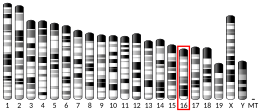The Rho GTPase activating protein 31 is encoded in humans by the ARHGAP31 gene. It is a Cdc42/Rac1 GTPase regulator.
Function
ARHGAP31 encodes a GTPase-activating protein (GAP). A variety of cellular processes are regulated by Rho GTPases which cycle between an inactive form bound to GDP and an active form bound to GTP. This cycling between inactive and active forms is regulated by guanine nucleotide exchange factors and GAPs. The encoded protein is a GAP shown to regulate two GTPases involved in protein trafficking and cell growth.
Clinical relevance
ARHGAP31 mutations result in a loss of available active Cdc42 and consequently disrupt actin cytoskeletal structures, causing syndromic cutis aplasia and limb anomalies.
External links
Further reading
-
Bandyopadhyay S, Chiang CY, Srivastava J, et al. (2010). "A human MAP kinase interactome". Nat. Methods. 7 (10): 801–5. doi:10.1038/nmeth.1506. PMC 2967489. PMID 20936779.
-
Jenna S, Hussain NK, Danek EI, et al. (2002). "The activity of the GTPase-activating protein CdGAP is regulated by the endocytic protein intersectin". J. Biol. Chem. 277 (8): 6366–73. doi:10.1074/jbc.M105516200. PMID 11744688.
-
Zhao C, Ma H, Bossy-Wetzel E, et al. (2003). "GC-GAP, a Rho family GTPase-activating protein that interacts with signaling adapters Gab1 and Gab2". J. Biol. Chem. 278 (36): 34641–53. doi:10.1074/jbc.M304594200. PMID 12819203.
-
Barrios-Rodiles M, Brown KR, Ozdamar B, et al. (2005). "High-throughput mapping of a dynamic signaling network in mammalian cells". Science. 307 (5715): 1621–5. Bibcode:2005Sci...307.1621B. doi:10.1126/science.1105776. PMID 15761153. S2CID 39457788.
-
Bonaldo MF, Lennon G, Soares MB (1996). "Normalization and subtraction: two approaches to facilitate gene discovery". Genome Res. 6 (9): 791–806. doi:10.1101/gr.6.9.791. PMID 8889548.
-
Danek EI, Tcherkezian J, Triki I, et al. (2007). "Glycogen synthase kinase-3 phosphorylates CdGAP at a consensus ERK 1 regulatory site". J. Biol. Chem. 282 (6): 3624–31. doi:10.1074/jbc.M610073200. PMID 17158447.
-
Nagase T, Ishikawa K, Kikuno R, et al. (1999). "Prediction of the coding sequences of unidentified human genes. XV. The complete sequences of 100 new cDNA clones from brain which code for large proteins in vitro". DNA Res. 6 (5): 337–45. doi:10.1093/dnares/6.5.337. PMID 10574462.
-
Strausberg RL, Feingold EA, Grouse LH, et al. (2002). "Generation and initial analysis of more than 15,000 full-length human and mouse cDNA sequences". Proc. Natl. Acad. Sci. U.S.A. 99 (26): 16899–903. Bibcode:2002PNAS...9916899M. doi:10.1073/pnas.242603899. PMC 139241. PMID 12477932.
-
Tcherkezian J, Triki I, Stenne R, et al. (2006). "The human orthologue of CdGAP is a phosphoprotein and a GTPase-activating protein for Cdc42 and Rac1 but not RhoA". Biol. Cell. 98 (8): 445–56. doi:10.1042/BC20050101. PMID 16519628. S2CID 25545141.
-
Dubois PC, Trynka G, Franke L, et al. (2010). "Multiple common variants for celiac disease influencing immune gene expression". Nat. Genet. 42 (4): 295–302. doi:10.1038/ng.543. PMC 2847618. PMID 20190752.
-
Lamarche-Vane N, Hall A (1998). "CdGAP, a novel proline-rich GTPase-activating protein for Cdc42 and Rac". J. Biol. Chem. 273 (44): 29172–7. doi:10.1074/jbc.273.44.29172. PMID 9786927.
-
Horne BD, Hauser ER, Wang L, et al. (2009). "Validation study of genetic associations with coronary artery disease on chromosome 3q13-21 and potential effect modification by smoking". Ann. Hum. Genet. 73 (Pt 6): 551–8. doi:10.1111/j.1469-1809.2009.00540.x. PMC 2764812. PMID 19706030.
This article incorporates text from the United States National Library of Medicine, which is in the public domain.




